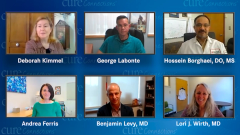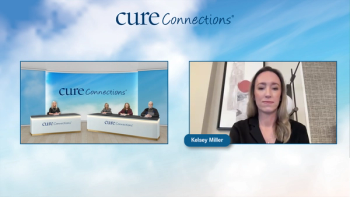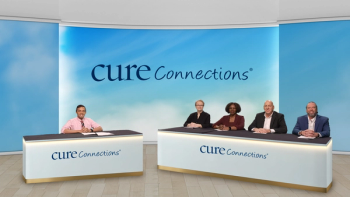
Molecular Testing for NSCLC: Historical Perspectives
Benjamin Levy, MD, of Johns Hopkins Sidney Kimmel Cancer Center, describes how molecular testing in non–small cell lung cancer has advanced and impacted treatment.
Episodes in this series

Hossein Borghaei, DO, MS: Hello, and welcome to this Cure Connections® video series titled “Educating Patients on Biomarker Testing.” I’m Dr Hossein Borghaei, the chief of thoracic medical oncology at Fox Chase [Cancer Center], part of Temple Health in Philadelphia, Pennsylvania. Joining me in this discussion are my colleagues Dr Lori Wirth, the medical director of the Center for Head and Neck Cancers at Massachusetts General Hospital in Boston; Dr. Benjamin Levy, the clinical director of medical oncology at Johns Hopkins Sidney Kimmel Cancer Center in Washington, D.C.; Andrea Ferris, the president and chief executive officer of LUNGevity; and our guest patients, George Labonte and Deborah Kimmel. Today we’re going to discuss a number of topics pertaining to educating patients on biomarker testing, including the use of biomarker testing to provide an individualized treatment plan.
I’m going to turn to my clinical colleagues Dr Levy and Dr Wirth to start the discussion, asking Dr Levy to start by providing a little historical perspective. I want to get into the evolving landscape involving the field of molecular testing. If you don’t mind going over some of where we’ve been and where we’re going, that would be a nice way to start the discussion.
Benjamin Levy, MD: Thanks, Hoss. I’ve been fortunate to witness these advances in a rapid way in non-small cell lung cancer. When I started, the running joke that I always said, if people asked why did you go into lung cancer, I go, “Well, it was easy.” There were really just three drugs at the time. Of course, I went in for other reasons, but there were three drugs. There was pemetrexed, bevacizumab, and erlotinib, and there really was no biomarker testing done.
Around 2009, we started to learn about potential relative mutations that are targetable in lung cancer with EGFR. About 15% of all lung adenocarcinomas had this mutation, and the fortunate part of that genetic alteration was that we had targeted therapies that we could leverage potentially for EGFR mutations. Excitingly, we’ve learned that EGFR is just chapter one of a novel that’s still being written on molecular testing in lung cancer. After EGFR, we’ve had ALK rearrangements that were identified, that we now have drugs for. Over the past five to 10 years, we’ve learned about more genetic alterations within the tumor that we can identify, that we can wed to targeted therapies. This includes RET fusions, ROS fusions, MET exon 14 skipping mutations, and BRAF V600E. I already mentioned EGFR and ALK. We’re learning more and more about emerging biomarkers like HER2 [human epidermal growth factor receptor 2] and KRAS G12C [Kirsten rat sarcoma 2 viral oncogene homolog].
I’ll summarize by saying that we’ve got many actionable mutations that we can test for in lung cancer that can inform treatment decisions, and that every patient who walks through the door should be tested for, for the most part. Lung cancer is on the leading edge. I feel lung cancer is the poster child for precision medicine, and it’s an exciting field.
Hossein Borghaei, DO, MS: I absolutely agree with you. There’s a reason most of the national guidelines, even international guidelines, have specific recommendations for molecular testing in lung and, to some extent, thyroid malignancies.
This transcript has been edited for clarity.


